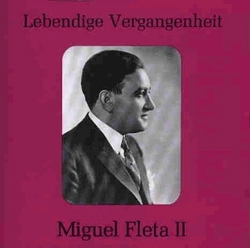| All Artists: Jacinto Guerrero, Emilio Arrieta, Manuel Esperon, Jimenez Colon y Martinez, Castadena y Forns, Jesus Guridi, Manuel del Castillo, Villa y Tardez, Osman Perez Freire, Tomas Breton, Ramos Carrion y Caballero, Claude-Joseph Rouget de Lisle, Miguel Fleta, Carlos Oller, Josefina Vera, Emilio Sagi-Baba, Rodrigo del Pozo, Matilde Revenga Title: Miguel Fleta II Members Wishing: 1 Total Copies: 0 Label: Preiser Records Release Date: 2/7/1995 Genres: Special Interest, Pop, Classical Styles: Vocal Pop, Opera & Classical Vocal, Historical Periods, Classical (c.1770-1830), Sacred & Religious Number of Discs: 1 SwapaCD Credits: 1 UPC: 717281890939 |
Search - Jacinto Guerrero, Emilio Arrieta, Manuel Esperon :: Miguel Fleta II
 | Jacinto Guerrero, Emilio Arrieta, Manuel Esperon Miguel Fleta II Genres: Special Interest, Pop, Classical
|
Larger Image |
CD DetailsSimilar CDs |
CD ReviewsFleta and the Spanish repertoire fyfa | Fairfield, Iowa USA | 10/06/2000 (5 out of 5 stars) "Although the international career of the Spanish tenor Miguel Fleta (1893-1938) was relatively brief (ten years or so), he was quite a hit in his time. Not only did he phenomenally succesfully perform in many important opera houses, he was also the creator of the role of Calaf in Puccini's opera 'Turandot' and thus the first tenor to sing the now so famous 'Nessun dorma'. The selections on this CD, most of them of arias and ensembles from 'zarzuelas' recorded between 1927 and 1931, used to be some of my great favorites during the LP era, and I'm so glad I've found them again now on disc. They show Fleta's almost hypnotic use of legato, masculinity of tone and expression, and quite considerable dash. He was always able to apply rubati with amazing swellings and diminuendos all over the place and make, as it were, time stand still and yet keep the music moving forward. It seems to me that in the Spanish repertoire as found on this disc he was even more persuasive in doing just that. Just listen to the numbers (six total) from Arrieta's very melodious zarzuela 'Marina' wherein he is joined by several Spanish colleagues, notably Emilio Sagi-Barba, in duets, trios, a quartet, etc., and you just wish (I do, that's for sure) they had recorded it complete. I find the other selections equally engaging. I must say that even though I hardly understand any Spanish, I feel drawn in every time I hear him sing these arias and songs. The very last number on this CD is actually not Spanish at all, although sung in that language. It is the famous Marseillaise, sung with chorus and quite stirringly so! At all times Fleta seemed to be capable of creating a different mood for anything he sang, whether it was martial, tender, exuberant, nostalgic, or what have you. The voice must have been immensely powerful, yet he could come round with the most incredible pianissimi you ever want to hear. His vocal enunciation and style may not be 'politically correct' in the more streamlined times we live in today, but, when used with so much conviction and artistry, I can relish it any day. I'm listening to it now."
|

 Track Listings (18) - Disc #1
Track Listings (18) - Disc #1